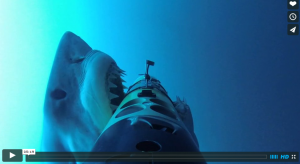In honor of Shark Week, I wanted to tackle the question everyone (ok, just me) is asking. Do sharks get angry? I’ll be the first to admit that this post started as a somewhat desperate attempt at combining my professional passion: anger, with my personal passion: sharks. That said, as I started working on it, I realized that it is actually a much more interesting question than I originally realized (i.e., it’s way more complicated than Jaws 4 made it seem).
 Sharks don’t get mad. They get even.
Sharks don’t get mad. They get even.
Here’s why it’s interesting… and complicated. There is no single, universally established, definition of an emotion. Psychologists (to say nothing of the other professionals who have a stake in defining emotion) don’t agree on what an emotion is and certainly haven’t been able to come up with something broad enough to capture all emotions (e.g., anger, sadness, guilt, curiosity) yet exclusive enough to keep out similar but non-emotional states (e.g., thirst, hunger).
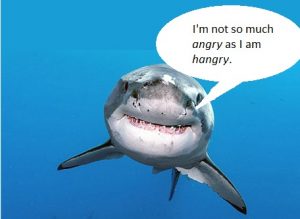 Our inability to define emotions has led to grave difficulties in studying them (or, on a whim, trying to decide if sharks feel them). What most psychologists would tell you, though, is that emotions are psychological states that include physiological arousal, some fairly predictable behaviors, and certain types of cognitions or thoughts. When we are angry, our sympathetic nervous system (the fight or flight system) kicks in so our heart-rate increases, our muscles tense up, our hair stands on end, etc. It’s a very similar physiological experience to fear.
Our inability to define emotions has led to grave difficulties in studying them (or, on a whim, trying to decide if sharks feel them). What most psychologists would tell you, though, is that emotions are psychological states that include physiological arousal, some fairly predictable behaviors, and certain types of cognitions or thoughts. When we are angry, our sympathetic nervous system (the fight or flight system) kicks in so our heart-rate increases, our muscles tense up, our hair stands on end, etc. It’s a very similar physiological experience to fear.
In fact, the same structures in the brain that are associated with fear are associated with anger. Most notably, the amygdala, is our brain’s emotional computer. It takes in information from the senses and initiates emotional responses when necessary. Essentially, it tells the rest of the brain, “time to get angry” (or scared, sad, etc.). While it’s particularly relevant with fear (research shows that stimulating it causes a fear response and removing it leads to the absence of fear), it also plays an important role in initiating anger and aggression. Stimulating it can lead to aggressive outbursts and, in the past, amygdalectomies have been used as an approach to dealing with uncontrollable aggression.
Turning now to the shark brain, what we see is that they are relatively similar, structurally, to the human brain (they don’t look at all similar… but they have similar parts).
 Most importantly with regard to anger is that they do have an amygdala which coordinates their fight or flight response. From a purely physiological perspective, there’s no reason to think they aren’t capable of feeling angry.
Most importantly with regard to anger is that they do have an amygdala which coordinates their fight or flight response. From a purely physiological perspective, there’s no reason to think they aren’t capable of feeling angry.
With regard to angry behaviors, it becomes more complicated. While humans will engage in all sorts of behaviors when angry, animals tend to just lash out in aggressive ways. Of course, they do that when they are scared too, further complicating things. In humans, we also have the luxury of inferring emotions from facial expressions but this doesn’t get us very far with sharks.
It’s hard to tell this:
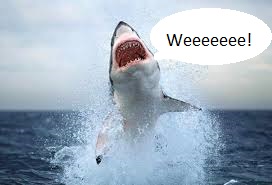 from this:
from this:
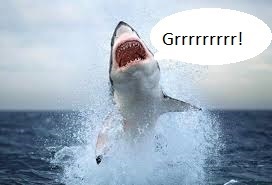
Finally, the third part of the angry experience is the cognitions. In people these are thoughts of having been wronged, having our goals blocked, having someone to blame, and believing the situation is unfair. Obviously, the cognitive piece is what’s lacking in sharks. They are not known for being smart (unless you count Deep Blue Sea).
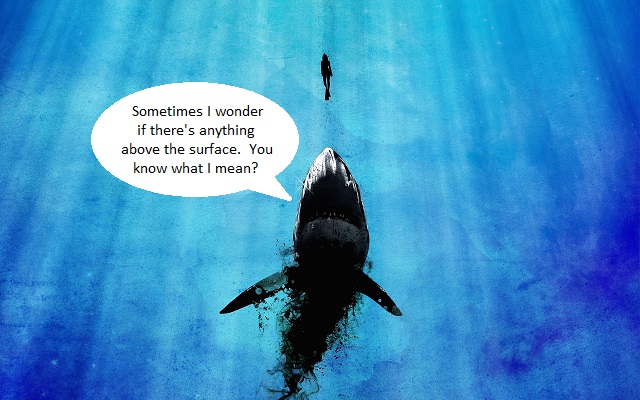 Wow, that is deep…
Wow, that is deep…
It’s probably unreasonable to say that a shark can feel wronged, unfairly treated, or even have the capacity to blame someone for something. They can have their goals blocked, though, and that can help us answer part of this question.
Infants and toddlers aren’t capable of understanding fairness either but we do know that they still get angry.
 Enter the frustration-aggression hypothesis, which says that aggression results from having one’s goals blocked. Aggression, a behavior, is not the same as anger, an emotion, but it’s also the primary way that animals will act when they are angry.
Enter the frustration-aggression hypothesis, which says that aggression results from having one’s goals blocked. Aggression, a behavior, is not the same as anger, an emotion, but it’s also the primary way that animals will act when they are angry.
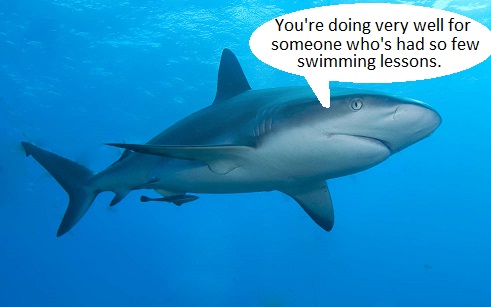 Thankfully, passive-aggression is rare in sharks
Thankfully, passive-aggression is rare in sharks
Essentially, when you interfere with what a person or animal really wants, it lashes out. They have studied frustration-aggression with mice, cats, dogs and, of course, humans (but not sharks). With infants, the studies look like this. Something the infant wants is placed where he or she can’t get to it (out of reach, behind glass, etc.). Infant tries to reach it, fails, and they observe how the infant reacts. Infants will do a lot of different things in this situation (cry, scream, move on to something else, etc.) but, sometimes, he or she will lash out by banging a fist or throwing something.
So, what would this study look like in sharks? Well, we would put something the shark wanted in a place it couldn’t get to.
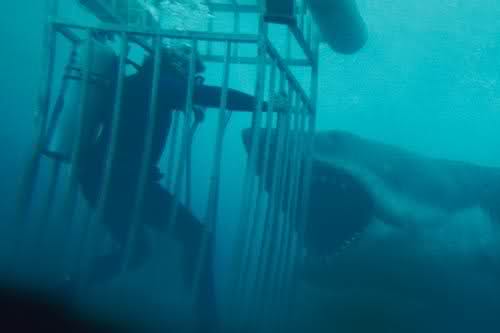 Like Richard Dreyfuss perhaps
Like Richard Dreyfuss perhaps
Then we would watch how it reacted.
My grant request for the funds to run this study is still pending.
 Fingers Crossed
Fingers Crossed
On the off chance my funding doesn’t come through, we can turn to some other sources.
Starting with this video here:
 That shark seems angry to me. Part of what we need to discern, though, is whether it’s anger, hunger, or even curiosity.
That shark seems angry to me. Part of what we need to discern, though, is whether it’s anger, hunger, or even curiosity.
Same thing here:
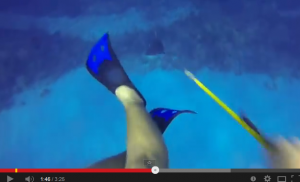 Taken together, I’m inclined to believe that, yes, sharks do feel anger. It’s probably not the same sensation of anger that humans feel as, without the intellectual capacity to evaluate and interpret events, it’s likely experienced very differently. However, at the core, anger is a primitive emotional state that likely exists because it provided the evolutionary advantage of energizing creatures to confront abuse or mistreatment. We know other animals experience emotions. Dogs get happy, elephants get sad, birds….
Taken together, I’m inclined to believe that, yes, sharks do feel anger. It’s probably not the same sensation of anger that humans feel as, without the intellectual capacity to evaluate and interpret events, it’s likely experienced very differently. However, at the core, anger is a primitive emotional state that likely exists because it provided the evolutionary advantage of energizing creatures to confront abuse or mistreatment. We know other animals experience emotions. Dogs get happy, elephants get sad, birds….
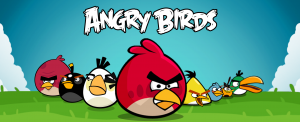
I wonder if they’ve tried meditation….
And recent evidence suggests that animals are even capable of feeling much more complex emotions like jealousy.
So why not sharks?
Don’t make me angry. You wouldn’t like me when I’m angry.
By Ryan C. Martin

